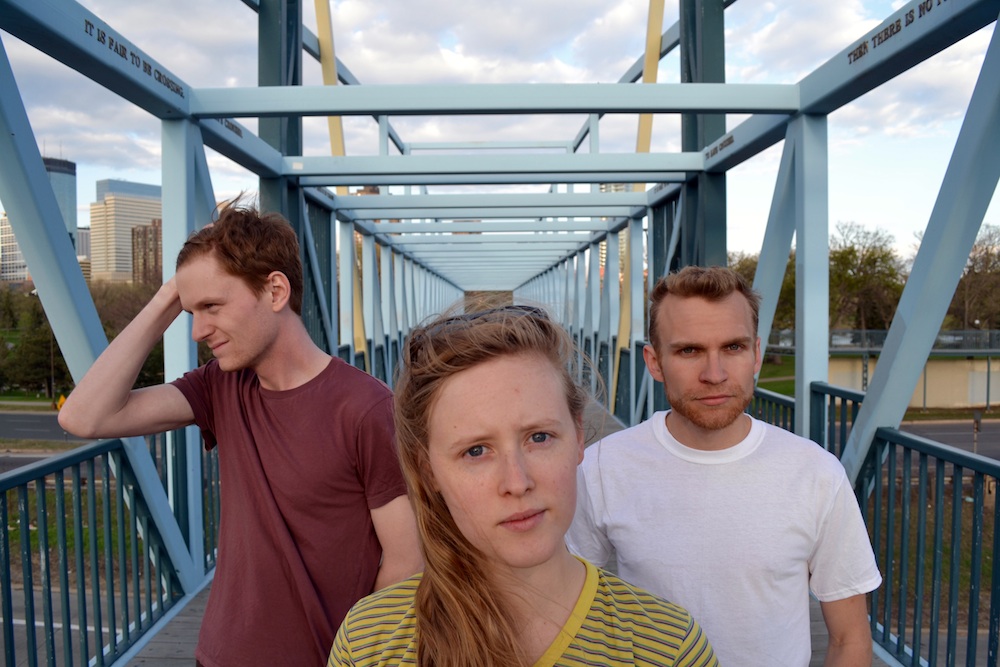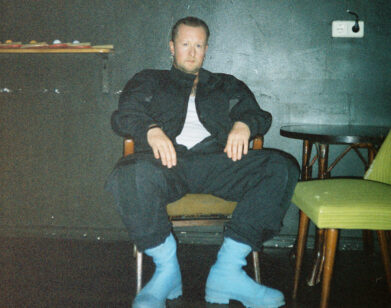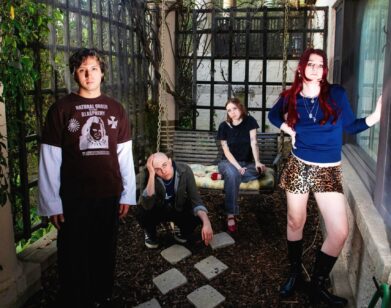Exclusive Album Stream: ‘Psychic Reader,’ Bad Bad Hats

Before she was a member of Bad Bad Hats, Kerry Alexander was a precocious ’90s kid, who watched music videos, used her computer’s microphone to record rough demos, and drew inspiration from the likes of Alanis Morissette and Kay Hanley of Letters to Cleo. When she moved to Minnesota for college, the singer-songwriter met bass player Noah Boswell and drummer Chris Hoge. After penning addictive hooks with melodic nods imbued with wistful lyricism and retro guitar riffs, Alexander, Boswell, and Hoge’s respective roots in jazz, grunge, and alternative pop coalesced into a sonically understated sound. Where one lacked, another compensated, and almost unwittingly, they conceived their identity as Bad Bad Hats.
Based in Minneapolis, the band signed with Afternoon Records and gained momentum with the release of their debut EP It Hurts in 2013. And now with their forthcoming album Psychic Reader, which we are pleased to premiere below, the trio shows no signs of wavering. Featuring production by Brett Bullion (Poliça, Bon Iver) and unforgettable components like the downbeat tempo of “All Nighter” and the rhythmic ascension of the titular track, Bad Bad Hats focuses on classic arrangements imbued with contemporary sentiments.
In anticipation of the LP’s official release on July 17, we caught up with Alexander over the phone to learn more.
LEA WEATHERBY: Were you born and raised in Minneapolis?
KERRY ALEXANDER: I was born in Minneapolis, but moved when I was five, quite young; I grew up in Birmingham, Alabama. We had so many family friends here and I guess I always felt that the North is where I belong.
WEATHERBY: When did you first become interested in music?
ALEXANDER: I started playing guitar when I was 12 or 13 and I did a lot of covers to learn chords. I was also really interested in poetry when I was younger, lyrics especially. I would just play by myself; I never played in a band until I met Chris and Noah at Macalester. The first time I played with Chris on drums, I was like, “It’s all happening!” I just really wanted to “rock,” [laughs] whatever that means.
WEATHERBY: How would you say the formative environment of college affected your music and began to shape your sound as a band?
ALEXANDER: I think part of the reason I never played in a band before was because I didn’t know that many people when I was younger who also made music. I went to high school in Tampa and there’s not really a great concert or music scene. There’s a punk scene growing now, but bands don’t really tour to Florida. All the bands I really liked, I rarely ever got to see in concert, so I was very reclusive with my music. I guess I didn’t feel like there were that many resources for me. When I came to college there was so much music happening everywhere and I worked for the radio station, which I loved, so all of a sudden it was like I found a network of people to play with and be inspired by and go to shows with. College was definitely the moment where I felt like part of a community.
WEATHERBY: How do your different backgrounds and musical experiences impact the songwriting process?
ALEXANDER: It shows itself in different ways and how we go about things is always changing, but I’m still the primary songwriter. It’s interesting because when I start songs I’ll usually come up with some basics, then I’ll bring it to Chris and Noah, and they have the know-how where they can help me build something. It’s almost always what I needed or wanted it to be.
WEATHERBY: Is there a theme behind Psychic Reader?
ALEXANDER: It didn’t start out with one, but I do love writing love songs because I love love. [laughs] They always start out as just feelings and emotions. In retrospect, a lot of songs deal with thinking back on a moment and wishing you could change it by saying something else or not saying anything at all. I think this album is sort of focused on past relationships I’ve had and reminiscing about things that were, but are no longer.
WEATHERBY: With tracks like “Things We Never Say” and “All Nighter,” I couldn’t help but think they were such timely songs in terms of how we interact romantically. It can be so easy to hide behind a different persona and so difficult to break through that protective membrane. Was anything like that inspiring some of your songs?
ALEXANDER: First of all, I love hearing what other people are getting from the songs because I have my ideas from the start but I want them to mean something different to everyone. I’ve been in a relationship for a long time, which I’m glad about, but I often look to my friends’ experiences for inspiration. I like putting myself in their shoes and I sympathize with a lot of my friends, seeing how they’re navigating the love terrain of today. I had a boyfriend in high school, I guess he wasn’t really my boyfriend, but I was in love and I moved away. I remember I would scroll through his Facebook page looking for something, I guess a sign that I was still important.
WEATHERBY: Are there any tracks on the album that you feel are the strongest?
ALEXANDER: All the songs are my small children, but I think I had a love-hate relationship with some of them. “Joseph” and “Fight Song” in particular had very long journeys in the songwriting process and those are two that we really struggled to get to where they are. I think “Spin” is one of our favorites. When we first started putting it together we had to laugh because the song and its instrumentation is just so fun and a little goofy maybe. It feels like the ’90s or Sugar Ray. It’s a different sound for us, but I think the lyrics on that one are close to me.
WEATHERBY: What’s the significance behind the album art?
ALEXANDER: Our friend, Emily Sames, does this amazing pointillism style and if you get up close, it’s all these little dots that make up these images. It seems like it takes so much time and focus but it turns out beautiful every time. I think she posted the moon that she did online and I bought the moon, had it framed, and it’s hanging in my living room. When we were thinking about the album artwork, we had a million ideas and then it was one of those things where the answer had been there all along, hanging above our heads! [laughs]
WEATHERBY: Was there something specific about the moon that spoke to you?
ALEXANDER: The moon is an everyday symbol but it’s important to me; I’m a cancer, I’m a moon sign, and it’s significant to my family. It just holds a lot of weight for me and I thought it would be a nice complement to the album and the story we were trying to tell.
WEATHERBY: You have some incredible pop tracks, but you also have a solid balance of genres, decades, and musical styles on the album. Is creating that balance a challenge or does it all come together very naturally?
ALEXANDER: When I was younger, when I became a teenager, I went through the phase of feeling like pop music means nothing, but now I have a great appreciation for pop songwriters and how much goes into that. The production is clean and everything about it is designed to hook you. I was reading an article about the music theory behind Katy Perry’s “Teenage Dream” and how there’s one chord of the song that you just don’t play; it never touches down, so you’re in a constant state of suspension. I was like, “Well that sounds cool, I want to write a song like that!” So “Psychic Reader” is a song that follows a similar kind of formula.
WEATHERBY: It’s frustrating when someone trivializes what goes into making a great pop song and my impression is, if every musician could do it, they would have.
ALEXANDER: Yeah, I think we certainly don’t want to shy away from pop sounds or form other strategies, but I think we’ll always maintain a certain lyrical style that reflects a part of how I grew up. It’s part of my musical history.
WEATHERBY: What’s in store after the album release?
ALEXANDER: We don’t have a full plan yet, but we are planning to plan that. [laughs]
FOR MORE ON BAD BAD HATS, VISIT THE BAND’S WEBSITE.






